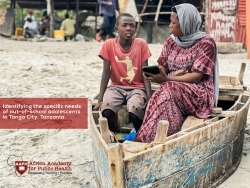
The ARISE Adolescent Health Survey in Tanga, Tanzania, is part of the broader initiative aimed at harnessing longitudinal data and digital technologies to enhance adolescent health across sub-Saharan Africa (SSA). Recognizing the dearth of longitudinal data on adolescent health in low- and middle-income countries (LMICs), particularly in SSA, the project focused on developing a standardized survey instrument. To bridge knowledge gaps, we implemented a longitudinal survey to collect adolescent health data across diverse SSA communities, including Tanga City. We expanded to include 20 schools, aiming to inform effective school-based programs with a total sample size of 1,100 adolescents, recognizing schools as promising platforms for adolescent health research and interventions.
Through baseline and evaluation surveys, the project successfully tracked changes in key adolescent health indicators and anaemia status over time. Use of mobile phones facilitated contact with adolescents, minimizing loss to follow-up across survey rounds. Analysis was conducted comparing conventional and remote data collection methodologies.
Dissemination efforts involved sharing findings with stakeholders at various levels, including the Tanga community, local and central government entities, and non-governmental stakeholders. Manuscript development and policy briefs were key components of the dissemination strategy, with plans for further engagement with relevant ministries and technical personnel.
Despite achieving successes, we encountered challenges during the follow-up surveys for implementing the intervention. These included difficulties in locating adolescents, lack of response from participants, instances of participants changing mobile phones, and parents not providing access to mobile phones or airtime for digital interventions.
Looking ahead, the project aims to advance publications of research findings and co-design interventions to address identified gaps in adolescent health across LMICs, including those in SSA. The collaborative efforts of the Tanzanian Mainland Ministry of Health (MoH) and Presidents’ Office–Regional Administration and Local Government (PORALG), Botnar Fondation and the AAPH team, were instrumental in the project's success, with generous support from Fondation Botnar.
